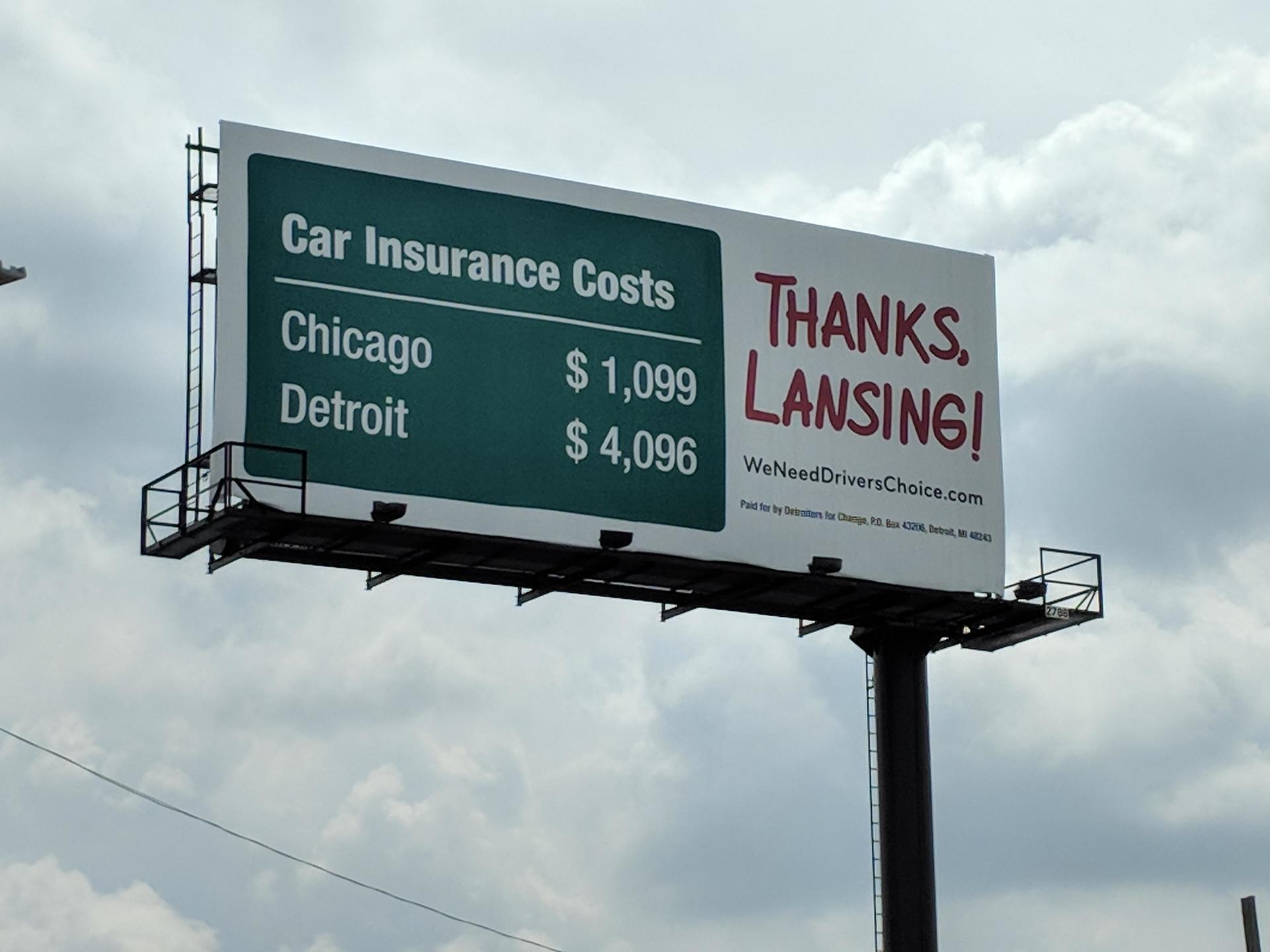
Well, we have one. Currently every Michigander with automobile insurance is required topurchase Personal Injury Protection at a cost of $500 each year. With 6 million insured drivers in Michigan, this translates to 3 billion which are spent every year on PIP. If instead, this money were offered back to drivers, because it is largely redundant with health insurance, massive revenues to the state treasury would result.
Auto accidents with bodily injury are incredibly rare, and the likelihood of using PIPis very low. Consequently, most Michiganders would choose to just forgo the cost, and take home their $1000 for a 2 car household. Yes, some of this cost would go on to healthcare premiums, but it is unlikely the employee portion would increase by more than $100 each year. So, each family would find itself with $900 extra. If all these families spent this money in Michigan, with a sales tax of 6 percent, the annual yield to the general treasury would be-
($3 Billion) (.9 ) (0.06) =$162,000,000 annually.
That is $162 million dollars each year, into the state general fund, without raising taxes one cent. Car insurance is not subject to sales tax, and neither are the medical services paid for with PIP. Simply by capturing tax revenue in this one cycle, the general fund should see a massive rise in revenue.
Statutorily, sales tax revenue does not currently pay for most roads in Michigan. However, this can be modified in the same Act which eliminates the requirement that drivers carry PIP. Using this approach, Governor-elect Whitmer could raise the revenue needed for road fixes, save Michigan families a ton of money on car insurance, and not have to raise taxes. It is almost too easy...

The MCCA essentially functions as a re-insurer of Michigan's automobile insurance industry, and political target for shady trial lawyers and politicians who receive large amounts of money from hospitals and trial lawyers. It collects money via car insurance fees, holds onto that money, invests it, and uses its proceeds to pay for accidents which cost more than $555,000. This is how car, home and business insurance companies operate.
A major fallacy that is perpetuated by either the unfamiliar or disingenuous is that eliminating mandatory unlimited Personal Injury Protection from auto insurance policies will only save drivers this $192 dollars each year. Consider this section of an email from Sherry Gay- Dagnogo's office
As you know, HB 5013 would not guarantee lower rates for the residents of Michigan, what it would have done is provide people the option to save approximately $15.00 a month by opting out of unlimited coverage for catastrophic claims. While any savings is good, $15.00 is not much of a reduction when a person is paying well over $200.00 a month for car insurance. Additionally, nobody ever plans on being in a catastrophic accident but it does happen, and when it does it costs thousands of dollars a month for treatment and care, without coverage from their auto insurance those costs are impossible for most families to pay.
Her $15 each month refers to the MCCA fee at the time this legislation was considered. But the reality is our car insurance requires the purchase of PIP, which is often about $1000 for each family each year. This PIP covers hospital bill dollars $1 through $555,000, none of which needs to be paid through automobile insurance, and could instead be covered through health insurance. Eliminating the requirement that all drivers carry PIP, and instead giving them the choice to do so , could save most drivers nearly $100 each month.
Most interestingly, this Democratic lawmaker is denying the value and importance of Medicaid expansion, which would cover a severely injured person. I have no clue why. None at all.

Mayor Duggan and 8 other Michigan residents have introduced a class action lawsuit in Michigan claiming the current car insurance system is unconstitutional. The premise is that the 1973 law creating Michigan's no-fault auto insurance system is unconstitutional. They hope to persuade the court that the system should be scrapped, and revert Michigan to a tort-based insurance plan such as Ohio or Indiana has. They are suing the Michigan Department of Insurance and Financial Services.
The no-fault aspect of Michigan's auto insurance system is not necessarily the main driver of high car insurance rates. 11 other states have no fault in some capacity , they all have lower car insurance rates and no others are in the 7 most expensive states. It does not seem that the no-fault aspect of Michigan's car insurance is the main driver of cost, but rather our unique PIP sets us apart.
Will this approach work? It will be interesting to see if the courts find that the residents have standing so the lawsuit can move forward, and it will be a long process. A faster means would be Driver's Choice legislation, but the legislature has failed on that front.

1. Removing credit scoring from setting auto insurance rates. Politically, this is a big winner. There are few advocating for a continuation of this policy, and trial lawyers and no-fault coalitions love it. However, it is the practice in 46 other states and states with this all have lower rates than Michigan . This sub-policy, while a political winner, will not lower overall rates, but spread them around.
2. Permit drivers to chose the amount of insurance they have. This is the big one, and will permit Michigan drivers to save a ton of money. Right now, every driver is required to carry a medical insurance rider which will cover all injuries for the rest of the driver's life. This is what PIP covers , and is about $1000 a year for a family. However, federal law opened access to health care coverage to all Michiganders, and this also covers the medical effects of a car accident. So this is where Michiganders can save a ton of money.
3. Seniors will not be required to purchase health care coverage at all. It is unclear how this differs significantly from bullet point 2, but my guess is that the proposal will require non-seniors to purchase some health care coverage, and seniors none. This is a political selling point to a large chunk of voters, but it is unclear how it will change rates for non-seniors.
4. Fee schedules for medical services related to an accident. This should end up reducing rates for the medical benefits of car insurance, but it is still unclear whether this is actually necessary. If my health insurance already treats the injuries from a car accident, perhaps a car insurance policy which just covered my medical deductible would be better.
5. Drivers will have the right to sue an at-fault driver for medical expenses. The implications of this are unclear. Presumably, it will take the liability insurance companies hold for the injuries caused by drivers, and shift it to individuals. Consequently, attorneys will see far fewer dollar signs when examining targets for lawsuits. The state will likely see fewer overall lawsuits, and those injured in automobile accidents will have the same rights as in many other states.
Overall, this plan is quite attractive, and the political coalition needed to pass it seems present. As we have written here, there are compelling reasons for both Republicans and Democrats to support changes. However, each side needs political pressure to make great change. Hopefully Detroiters for Change, the group behind the billboards, can accomplish just that.

The gist of Morse's alleged scam is that he has clients who have been in car accidents, and he sends them to a"clinic"in which his now former brother-in-law has a business interest. According to State Farm'slawsuit, the"clinic" would charge State Farm $5000 per MRI (legitimate hospitals charge around $1000), which would then go to Morse's family, or perhaps Morse directly. The lawsuit also suggests that the clinic would modify results to benefit the patient and lead to higher medical benefits due to an accident.
State Farm, which is required by state law to pay an unlimited amount of money for medical care, reimbursed this. The thing is, YOU AS A DRIVER HAVE PAID THIS MONEY TO STATE FARM (assuming this is your carrier )! Pardon the caps, but I often hear from folks, "I can't believe they pay that". It is not State Farm paying the bill, it is all of us, and all of us have preserved a system which permits this kind of corruption for too long.
The thing is, while the accusations against Morse are flagrantly disgusting, the system is awash with medical facilities charging $2000 for each MRI, and pocketing the difference, or attorneys seeking damages for marginal medical treatments simply because they can, and the money is there. Auto insurance companies have made clear their desire to exit the medical insurance industry , because they do not even profit from providing insurance. The only solution is to eliminate unlimited PIP, which would reduce the incentive to defraud the system, and keep money in your pockets.

-hear from a diverse set of voices about experiences with automobile insurance
-clarify the mission, short term objectives, and tactics for MAIRA
-identify action steps to change the narrative about car insurance in Michigan.
The meeting will be held at the Starbucks located at
on June 7th, 7 to 8 pm. Please RSVP by emailing webmaster@michiganautoinsurancereform.com so we know to look for you!
The thorny issue of redlining quickly arises any time car insurance comes up in conversation. Legitimate questions exist about whether the automobile insurance industry is discriminating against people of color by using zip codes and credit scores to determine insurance rates. Those whose finances are positively affected by redlining feel protective of their conditions. This is especially important in Detroit, a city with nasty racial scars in its relationship with suburbs , where lower automobile insurance rates are found.
Here we will seek to discuss and inform about redlining, though perhaps not conclusively. Please join in the discussion below.
Fundamental to many groups and people devoted to car insurance reform is a desire end to the use of credit scores and zip codes in determining car insurance rates. The thinking is that there is no relationship between driving skill and credit history. Further, the histories of zip codes and credit scoring is racially tinged in Michigan , without a doubt.
47 states permit the use of credit histories in determining automobile insurance rates. This issue has faced lawsuits , state legislatures , and peer reviewed journals. The findings indicate that credit histories are tightly correlated to claims , not necessarily accident rates, and consequently are a valid means of predicting payouts and thus rates. If reform does not affect payouts, then the same number of dollars will have to be collected by automobile insurance companies to cover costs in Michigan, which are outrageously high.
Interesting but important to note in this is that the loudest voices regarding the ending of credit scoring in setting insurance rates are some of the best compensated by the trial lawyer and hospital PACs. Ending the use of credit scores in insurance scoring will not lead to a decrease in insurance rates for all Michiganders. It will lead to a redistribution of automobile insurance costs to individuals with strong credit scores. And the reality is that insurance companies in Michigan pay out vastly more money in personal injury costs than other states, because of other factors. They will have to get this money from somewhere, and it will be through premiums.
Zip codes are another interesting case. Due to its social and racial history, Detroit is one of the most segregated cities in America. Consequently, every social, political, and economic issue comes with significant racial baggage. And without a doubt, residents of zip codes within Detroit face higher premiums than those of similar zip codes (in terms of median home price and median income) outside Detroit.
Politically, it will be difficult to assemble a coalition of legislators committed to reform with constituencies on the same page regarding the use of credit scores and zip codes. Perhaps a happy medium would be reform of mandatory PIP insurance, which would lower insurance rates for all, a reset on claims data in the city, and a program to improve credit scores within the black community, which will save African Americans money not just on car insurance, but on loans as well. With these three efforts, all Michiganders will see a rate decrease and many black Michiganders will have opportunities to save via credit improvement.

Recently we featured commentary on why each political
party
should
support an end to Michigan’s no-fault automobile insurance and mandatory
unlimited PIP coverage. However,
political parties are diverse entities, and it is worth examining how factions
within each party might view automobile insurance reform in a positive
light.
Progressives identify with many causes, some seemingly disparate, but fundamentally progressives believe in equitable economic and social justice for all , a reduction in the influence of PACs and corporations in politics , and logical solutions to universal problems. These are all laudable aspirations, and speak directly to a need for significant automobile insurance reform.
-Currently Michigan’s car insurance system consistently provides profits to lawyers and hospitals at the expense of people. These small, powerful, and wealthy interest groups are essentially taking money from individuals through legal means sanctioned by the state government. Any time I explain how the system works, people exclaim " I can't believe the insurance companies pay for that ", and I remind them, you pay for that, richpeoplepay for that, and poor people pay for that.
-PACs are speaking loudly on the matter of automobile insurance reform, while the voices of independent and individual Michiganders is muted. There are PACs representing the insurance industry, trial lawyers , and hospitals , but there is no voice speaking for everyday Michiganders.
-For the entirety of existence, progressives have argued for sensible solutions to big problems. Their mostpopular programs and laws are ultimately nonpartisan because they benefit everyone. This gives good reason for progressives to push for an end to mandatory PIP, since all Michiganders are now guaranteed the right to access affordable health care with no lifetime limits.
On a more philosophical note, it is in progressive’s interest to appear in favor of some reductions in government regulations on matters outside of marijuana use. Frequent and perhaps lazy criticisms of progressives are that they wish for the government to regulate everything, supporting no-fault reform and the elimination of mandatory unlimited PIP would demonstrate faith in a reduction of government regulation.
In a future post we’ll examine the Libertarian argument for reform, but please leave a comment below, whether you’re a progressive or not!

- The average Ohioan pays nearly $1000 less per year in car insurance than the average Michigander. This, we knew. The major driving question for Michiganders should be why this is the case.
-Reindl claims that Ohioans receive less coverage as a result. A more realistic argument is that Ohioans are allowed to purchase less coverage . Ohio has at-fault insurance with limited coverage, meaning an individual is able to carry only $25,000 of personal liability in the case of an accident. In Michigan, health coverage is unlimited, which means trial lawyers have incentives to pursue cases against insurance companies, rather than individuals, because insurance companies have lots of assets (your assets, since you pay for insurance).
-Health insurance companies in Ohio want to be reimbursed for expenses. Because health insurance companies in Ohio take care of the majority of health related problems resulting from accidents, they want to be reimbursed for their expenses in the case of an accident. This reduces the incentive for a hospital to overcharge, or a lawyer to seek damages, since the health insurance company is a larger purchaser of health care than an automotive insurer.
- Medical clinics are predatory and profit driven on both sides of the border. Solicitation by shady medical providers and lawyers is common, as these groups rely on accidents and fear of accidents to support their business model.
- Cleveland has much lower rates than Detroit primarily because of a lack of Personal Injury Protection and its associated white-collar fraud. Because there is no market for frivolous claims and lawsuits, since there is no large pool of citizens' money to draw from, there is less incentive for attorneys and hospitals to sue and charge automobile insurers for care.
-Redlining, or differences in rates between cities and suburbs exist, but not as severely as in Detroit. Cleveland has a much lower percentage of white residents, but even residents in heavily black neighborhoods do not face rates as steep as those in Detroit. Experts in insurance markets claim that differences between the cities is due primarily to no-fault laws.
-Fred Durhal III and Sherry Gay-Dagnogo do not seem to get it. Both are quoted as alluding to red-lining as the primary reason for high automobile insurance rates, but both accept large amounts of campaign cash from hospitals and trial lawyers. Rose Mary Robinson, however, speaks as a independent voice on the matter.
-The major downside mentioned is the possibility of automobile accident victims ending up in Medicaid facilities rather than the profiteering facilities which proliferate in Michigan. However, automobile reform could include smoother transitions for the seriously injured onto Medicaid.
A missing piece of Reindl's puzzle was something we'll study more here. While median household income in the two states is similar , Ohio's state and local governments takes in $400 of tax revenue more per person. This is despite and a sales tax of 5.75%, 0.25% less than Michigan's. In Michigan, auto insurance, attorney fees, and hospital bills are all not subject to sales tax. So, if every Michigan driver had that $1000 she or he spent on car insurance back in his or her pockets, state coffers would reap significant benefits. Overall though, Reindl did great reporting which should be continued!

The core domestic message of the Republican party platform is that individuals should make choices for themselves, government should avoid mandating solutions for everyone, and government should respond to individuals, not corporate interests. These beliefs are entirely in conflict with mandatory personal injury protection, a duplicate form of health care coverage Michiganders are force to purchase through state law. Theoretically, a Republican could not argue that individuals should be required to purchase a product by the government which they do not need, and which serves no good for the state. The vast majority of states have much lower requirements for health care coverage purchased via automobile insurance.
How could a Republican justify removing requirements to purchase PIP and reform car insurance?
-View this as essentially a tax cut which costs the government nothing. Removing PIP will allow insurance companies to charge hard-working individuals and families $1000 less per year. The 2016 median family income in Michigan is $52,000 , so this change would represent a nearly 2% tax cut for every Michigan family. That is not a small deal. Yes, Medicaid might bear a larger burden, but the costs of coverage under Medicaid are MUCH lower than via automobile insurance.
-Argue this provides individuals freedom to make their own choices. Even without mandatory PIP coverage in car insurance, people can choose their own long term care insurance or disability income insurance from many providers, which will cover a Michigander injured via any mechanism, not just a car accident. But everyone shouldn't be coerced by the government to make this purchase.
-Frame reform as the elevation of personal interests over corporate interests. It is no secret that well funded lobbying groups advocate against reform or for the ossification of giveaways to their industries. If the Republican Party truly believes it is the party which stands with individuals over corporations, consumer rights would trump policies requiring the level of medical insurance currently mandated.
All this, however, presumes Republicans actually care about the things they claim to care about. Unfortunately, many Republicans, as noted in our database receive boatloads of campaign donations from the corporate interests their national party claims to put second. For example, Curt VanderWall received a combined $2,750 to support the interests of hospitals and trial lawyers instead of Michiganders, Steve Marino accepted $3000, and Jim Runestad accepted $3700. It's funny how those quantities are right around what the author pays for car insurance annually. Perhaps we could all purchase the ear and voice of a state representative for the cost of a car insurance policy.

Well, we have one. Currently every Michigander with automobile insurance is required topurchase Personal Injury Protection at a cost of $500 each year. With 6 million insured drivers in Michigan, this translates to 3 billion which are spent every year on PIP. If instead, this money were offered back to drivers, because it is largely redundant with health insurance, massive revenues to the state treasury would result.
Auto accidents with bodily injury are incredibly rare, and the likelihood of using PIPis very low. Consequently, most Michiganders would choose to just forgo the cost, and take home their $1000 for a 2 car household. Yes, some of this cost would go on to healthcare premiums, but it is unlikely the employee portion would increase by more than $100 each year. So, each family would find itself with $900 extra. If all these families spent this money in Michigan, with a sales tax of 6 percent, the annual yield to the general treasury would be-
($3 Billion) (.9 ) (0.06) =$162,000,000 annually.
That is $162 million dollars each year, into the state general fund, without raising taxes one cent. Car insurance is not subject to sales tax, and neither are the medical services paid for with PIP. Simply by capturing tax revenue in this one cycle, the general fund should see a massive rise in revenue.
Statutorily, sales tax revenue does not currently pay for most roads in Michigan. However, this can be modified in the same Act which eliminates the requirement that drivers carry PIP. Using this approach, Governor-elect Whitmer could raise the revenue needed for road fixes, save Michigan families a ton of money on car insurance, and not have to raise taxes. It is almost too easy...

The MCCA essentially functions as a re-insurer of Michigan's automobile insurance industry, and political target for shady trial lawyers and politicians who receive large amounts of money from hospitals and trial lawyers. It collects money via car insurance fees, holds onto that money, invests it, and uses its proceeds to pay for accidents which cost more than $555,000. This is how car, home and business insurance companies operate.
A major fallacy that is perpetuated by either the unfamiliar or disingenuous is that eliminating mandatory unlimited Personal Injury Protection from auto insurance policies will only save drivers this $192 dollars each year. Consider this section of an email from Sherry Gay- Dagnogo's office
As you know, HB 5013 would not guarantee lower rates for the residents of Michigan, what it would have done is provide people the option to save approximately $15.00 a month by opting out of unlimited coverage for catastrophic claims. While any savings is good, $15.00 is not much of a reduction when a person is paying well over $200.00 a month for car insurance. Additionally, nobody ever plans on being in a catastrophic accident but it does happen, and when it does it costs thousands of dollars a month for treatment and care, without coverage from their auto insurance those costs are impossible for most families to pay.
Her $15 each month refers to the MCCA fee at the time this legislation was considered. But the reality is our car insurance requires the purchase of PIP, which is often about $1000 for each family each year. This PIP covers hospital bill dollars $1 through $555,000, none of which needs to be paid through automobile insurance, and could instead be covered through health insurance. Eliminating the requirement that all drivers carry PIP, and instead giving them the choice to do so , could save most drivers nearly $100 each month.
Most interestingly, this Democratic lawmaker is denying the value and importance of Medicaid expansion, which would cover a severely injured person. I have no clue why. None at all.

Mayor Duggan and 8 other Michigan residents have introduced a class action lawsuit in Michigan claiming the current car insurance system is unconstitutional. The premise is that the 1973 law creating Michigan's no-fault auto insurance system is unconstitutional. They hope to persuade the court that the system should be scrapped, and revert Michigan to a tort-based insurance plan such as Ohio or Indiana has. They are suing the Michigan Department of Insurance and Financial Services.
The no-fault aspect of Michigan's auto insurance system is not necessarily the main driver of high car insurance rates. 11 other states have no fault in some capacity , they all have lower car insurance rates and no others are in the 7 most expensive states. It does not seem that the no-fault aspect of Michigan's car insurance is the main driver of cost, but rather our unique PIP sets us apart.
Will this approach work? It will be interesting to see if the courts find that the residents have standing so the lawsuit can move forward, and it will be a long process. A faster means would be Driver's Choice legislation, but the legislature has failed on that front.

